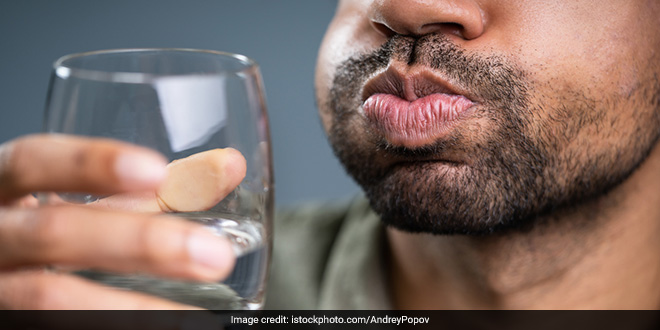Highlights
- Researchers at ICMR conducted a cross-sectional study at Delhi’s AIIMS
- The study was conducted from May-June on 50 COVID-19 patients
- All gargle samples were comparable to corresponding swab samples: ICMR
New Delhi: A study published by the Indian Council of Medical Research (ICMR) has revealed that gargle lavage may be a feasible alternative to swabs for sample collection for the detection of SARS-CoV-2. The primary objective of this study was to assess agreement between gargle lavage and swab as an appropriate respiratory sample for the detection of SARS-CoV-2, said ICMR. The secondary objective was to assess the patient acceptability of the two sampling methods. The top researchers at ICMR conducted a cross-sectional study at AIIMS hospital in Delhi from May-June on 50 COVID-19 patients.
The ICMR study pointed out that whether the risk of aerosol generation was similar to swab collection (commonly leads to coughing and sneezing) or higher was not clear.
To minimize the risk of transmission due to aerosols and to maximize the benefits of this method of collection, it would be best to employ it for home collection. Furthermore, it cannot be used in patients who are critically ill as well as in young children/patients who may not be able to follow instructions/perform gargle, it said.
“Preliminary results of the study show that the gargle lavage may be a viable alternative to swabs for sample collection for the detection of SARS-CoV-2. Adoption of gargle lavage for sample collection will have a significant impact as it will enable easy self-collection, relieve healthcare workers and also lead to substantial cost savings by reducing the need for swabs and personal protective equipment,” concluded the findings of the study.
According to the study, all gargle samples were positive and comparable to their corresponding swab samples irrespective of the symptoms and duration of illness.
The cycle threshold (C ) values for gargle samples were slightly higher but comparable to those of swabs. The majority (72%) of the patients reported moderate to severe discomfort with swab collection in comparison to 24 per cent reporting only mild discomfort with gargle collection, it said adding that bland-altman plot showed good agreement between the two methods.
According to ICMR, swab collection has several drawbacks also as it requires training, exposes the healthcare workers (HCWs) to the virus-containing aerosols and has poor patient acceptability and is resource-intensive.
Also Read: Study From United States Suggests COVID-19 Cannot Be Transmitted Through Breast Milk
An alternative sample collection method that could overcome most of these limitations without compromising the yield of the test is the need of the hour. One such method is the collection of gargle lavage. Although the use of gargle specimens is not new, at present, there is little published information on the suitability of gargle specimens to diagnose SARS- CoV-2 infection, the study highlighted.
“Paired Nasopharyngeal and oropharyngeal swab (NPS and OPS) and gargle samples were taken within 72 hours of their diagnosis. Samples were processed by reverse transcription-polymerase chain reaction (RT-PCR) for detection of SARS-CoV-2. Post-sample collection, a 10-point scale was administered to assess the level of discomfort with either of the collection methods,” stated the study published in the Indian Journal of Medical Research (IJMR).
Also Read: Here’s What You Should Know About Pune’s Sero-Survey Result
(Except for the headline, this story has not been edited by NDTV staff and is published from a syndicated feed.)
NDTV – Dettol Banega Swasth India campaign is an extension of the five-year-old Banega Swachh India initiative helmed by Campaign Ambassador Amitabh Bachchan. It aims to spread awareness about critical health issues facing the country. In wake of the current COVID-19 pandemic, the need for WASH (Water, Sanitation and Hygiene) is reaffirmed as handwashing is one of the ways to prevent Coronavirus infection and other diseases. The campaign highlights the importance of nutrition and healthcare for women and children to prevent maternal and child mortality, fight malnutrition, stunting, wasting, anaemia and disease prevention through vaccines. Importance of programmes like Public Distribution System (PDS), Mid-day Meal Scheme, POSHAN Abhiyan and the role of Aganwadis and ASHA workers are also covered. Only a Swachh or clean India where toilets are used and open defecation free (ODF) status achieved as part of the Swachh Bharat Abhiyan launched by Prime Minister Narendra Modi in 2014, can eradicate diseases like diahorrea and become a Swasth or healthy India. The campaign will continue to cover issues like air pollution, waste management, plastic ban, manual scavenging and sanitation workers and menstrual hygiene.
[corona_data_new]



























